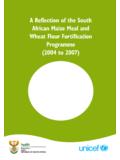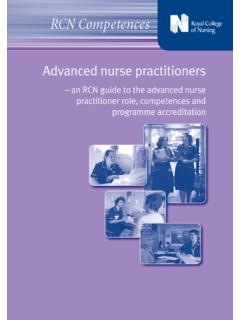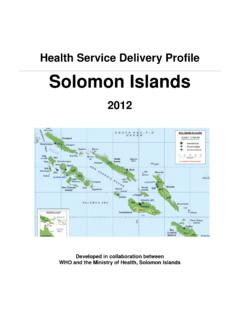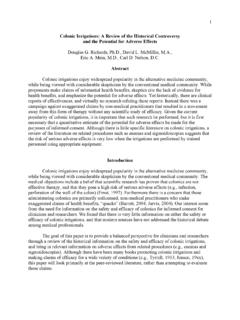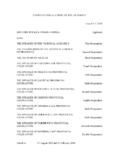Transcription of Health and Democracy-Contents - Section 27
1 200 Health & DemocracyChapter 7 traditional and alternative Health care traditional and alternative Health care 201 CONTENTS Introduction 202 Defi nitions 202 traditional and alternative Health care in South Africa 203 The impact of colonialism 204 The gap between biomedicine and traditional medicine 205 Current research into traditional medicines 206 Relevant law and policy on traditional Health care 208 Recognising and protecting indigenous knowledge 208 The constitutional framework 209 The traditional Health Practitioners Act 211 Regulating traditional practices that may be harmful 214 Regulating alternative Health care 214 Patient rights 215 Registering and regulating traditional and alternative medicine 216 Steps towards registration and regulation 216 Resistance to registration and regulation 217 Other laws that impact on traditional and alternative Health care 218 The Medical Schemes Act 219 The Basic Conditions of Employment Act 219 The National Health Act 219 The National Environmental Management.
2 Biodiversity Act and the Patents Amendment Act 220 traditional Health practitioners and HIV/AIDS 221 Co-operating with traditional healers on HIV/AIDS 221 The government s Operational Plan 222 Conclusion 224202 Health & IntroductionThe main focus of the chapter is on traditional Health care, discussing how this system which was marginalised in the past is in the process of being recognised and regulated by South African policy and law. It also explains why traditional medicines need to be registered and why government has a duty to ensure that all medicines regardless of their source are safe and chapter begins, however, by providing universally accepted defi nitions of traditional Health care and alternative Health care. This is necessary because of the disapproving fashion in which discussion about traditional and alternative Health care has often taken place.
3 It also examines the tensions between traditional and alternative Health systems on the one hand and biomedicine on the other, with a particular focus on ethical and legal nitions A variety of imprecise terms are often used in discussions about traditional and modern Health care systems, including alternative versus conventional and traditional versus western . Using these terms refl ects the awkwardness of the discussion and the fact that it is politically loaded. These terms are often unhelpful in describing the many diverse principles, philosophies and practices they represent. The World Health Organisation (WHO) acknowledges this diffi culty, but also notes that working defi nitions are essential. It therefore proposes this defi nition for traditional medicines: Diverse Health practices, approaches, knowledge and beliefs incorporating plant, animal and/or mineral based medicines, spiritual therapies, manual techniques and exercises applied singularly or in combination to maintain well-being, as well as to treat, diagnose or prevent illness.
4 The WHO gives this defi nition for African traditional medicine: The sum total of all knowledge and practices, whether explicable or not, used in diagnosis, prevention and elimination of physical, mental, or societal imbalance, and relying exclusively on practical experience and observation handed down from generation to generation, whether verbally or in writing. traditional and alternative Health care 203 According to the WHO, alternative Health care relates to practices such as acupuncture, homeopathy and chiropractic systems that are a broad set of Health care practices that are not part of a country s own tradition, or not integrated into its dominant Health care systems . Other authors have defi ned alternative and complementary Health care more specifi cally as those interventions for improving, maintaining, and promoting Health and well-being, preventing disease, or treating illnesses that are not part of standard North-American biomedical regimen of Health care or disease prevention.
5 In this chapter: we use the terms alternative, complementary and allied Health systems and practitioners interchangeably to mean the same thing; and we do not include the practice of traditional Health practitioners as part of alternative Health care because we deal with traditional Health care as a separate traditional and alternative Health care in South AfricaThe main focus of Health law and policy in South Africa is on biomedicine, its practitioners and its regulation. Biomedicine, which is also known as evidence-based medicine, is based on the application of the principles of the natural sciences, especially biology and biochemistry. Biomedicine is central to the practice of allopathic Health care. By this we mean, the treatment of disease through biomedical medicines and surgery, and a special concern for preventive and public Health measures.
6 But in addition to biomedicine, South African has its own indigenous medical tradition, a tradition that predated modern biomedicine and which continues up to today. African traditional healers are loosely divided into two categories: diviner-diagnosticians (also called diviner-mediums), who give a diagnosis through spiritual means; and healers or herbalists, who choose and supply remedies on the basis of a diagnosis. 204 Health & DemocracyIn South Africa, however, most people associate traditional Health care with the herbs, remedies (or muti) and advice given by African traditional healers known as sangomas or izinyangas. The WHO estimates that up to 80% of people in Africa make use of traditional medicine. In sub-Saharan Africa, the ratio of traditional healers to the population is approximately 1:500, while medical doctors have a 1:40 000 ratio to the rest of the population.
7 This means that there are 80 times more traditional healers than biomedical doctors. South Africa s Department of Health (DoH) estimates that there are 200 000 traditional healers active in this country put, millions of people in South Africa and across the continent make use of traditional forms of Health care instead of (or in addition to) biomedicine. Sometimes they do this because of choice, but more often because they do not have access to appropriate Health care services because they are too poor or because these services are not available in peri-urban and rural areas. Nevertheless, both traditional and alternative Health care have the potential to make a valuable contribution towards improving the Health of all people in South Africa. However, the historic lack of offi cial recognition, research and focused development has created a gap in standards between these systems and biomedicine.
8 The impact of colonialismHuman knowledge of medicine has developed over many centuries and comes from many different parts of the world, including Africa. In the history of medicine, Indian, Egyptian, Chinese, Islamic and European scholars and traditions have all added to our knowledge of disease and how to treat it. In Africa, however, a century of colonialism, cultural imperialism and apartheid in South Africa have held back the development of African traditional Health care in general and medicines in particular. During several centuries of conquest and invasion, European systems of medicine were introduced by colonisers. Pre-existing African systems were stigmatised and marginalised. Indigenous knowledge systems were denied the chance to systematise and develop. traditional and alternative Health care 205 Exclusion of traditional and alternative Health care In 1953, the then Medical Association of South Africa declared alternative therapies illegal and unscientifi c, and included provisions in the medical code that prohibited co-operation between allopathic and alternative practitioners.
9 The Witchcraft Suppression Act of 1957 and the Witchcraft Suppression Amendment Act of 1970 prohibited diviner traditional healers from practising their trade. Today, the issue of traditional versus allopathic Health care is often politicised and confused. There is no doubt that African traditional Health care is a legitimate branch of medicine that has been historically suppressed. However, this history does not mean that traditional and alternative Health systems should not be measured by the same standards as allopathic Health care today. Standards that guarantee the safety and effi cacy of medicines, for example, are important, regardless of the medicines origin. Indeed, these standards are vital if traditional and alternative Health care systems are to gain recognition and if people s rights are to be protected.
10 The gap between biomedicine and traditional medicineBiomedical literature refers to the use of traditional medicines as phytotherapy, which means medicine using plants . However, many other branches of medicine also have their origins in the use of herbs and plants. Similarly, although colonial powers and structures criticised traditional Health care because of its strong spiritual component, they overlooked the fact that for many centuries European and other Health care systems also had strong spiritual and religious components. Nowadays, however, one of the main distinctions between the two is that much of traditional medicine is based on observation, contrasted with the scientifi cally verifi ed cause-and-effect of of the consequences of many years of discrimination and unregulated traditional Health care practice has been the widening of the gap between traditional healers and the practitioners of biomedicine.
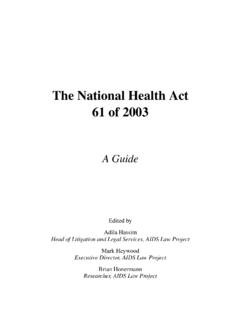
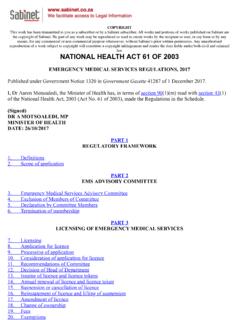
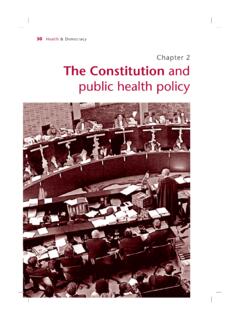
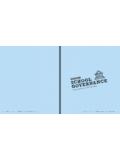
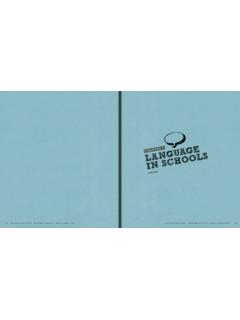
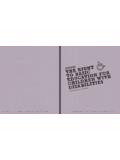
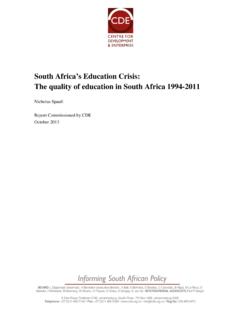
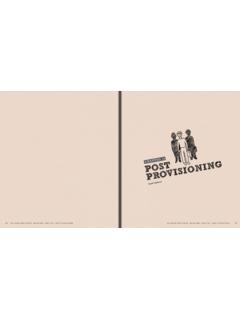
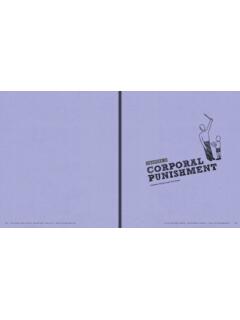
![Traditional Helath Practitioners Act [No. 35 of 2004]](/cache/preview/c/7/d/4/5/8/f/6/thumb-c7d458f692bae21cab4d196ac02eea51.jpg)

